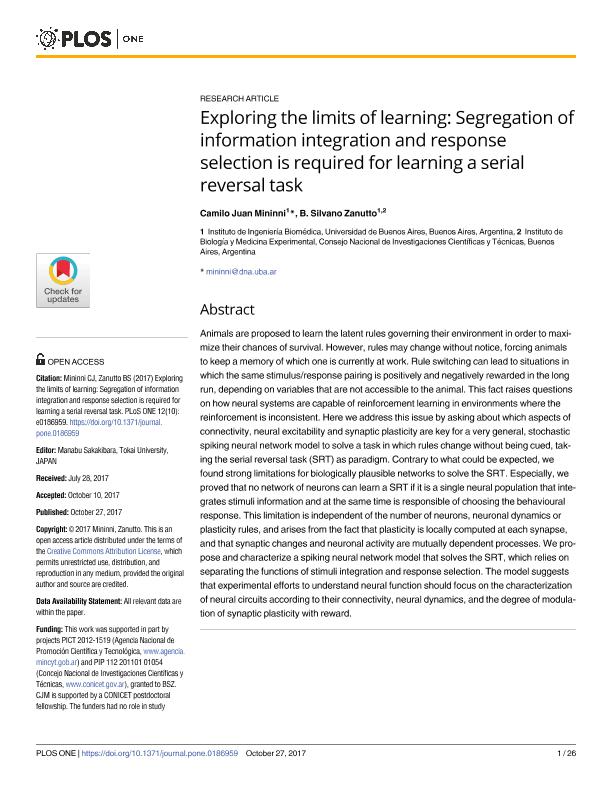Artículo
Exploring the limits of learning: segregation of information integration and response selection is required for learning a serial reversal task
Fecha de publicación:
10/2017
Editorial:
Public Library of Science
Revista:
Plos One
ISSN:
1932-6203
Idioma:
Inglés
Tipo de recurso:
Artículo publicado
Clasificación temática:
Resumen
Animals are proposed to learn the latent rules governing their environment in order to maximize their chances of survival. However, rules may change without notice, forcing animals to keep a memory of which one is currently at work. Rule switching can lead to situations in which the same stimulus/response pairing is positively and negatively rewarded in the long run, depending on variables that are not accessible to the animal. This fact raises questions on how neural systems are capable of reinforcement learning in environments where the reinforcement is inconsistent. Here we address this issue by asking about which aspects of connectivity, neural excitability and synaptic plasticity are key for a very general, stochastic spiking neural network model to solve a task in which rules change without being cued, taking the serial reversal task (SRT) as paradigm. Contrary to what could be expected, we found strong limitations for biologically plausible networks to solve the SRT. Especially, we proved that no network of neurons can learn a SRT if it is a single neural population that integrates stimuli information and at the same time is responsible of choosing the behavioural response. This limitation is independent of the number of neurons, neuronal dynamics or plasticity rules, and arises from the fact that plasticity is locally computed at each synapse, and that synaptic changes and neuronal activity are mutually dependent processes. We propose and characterize a spiking neural network model that solves the SRT, which relies on separating the functions of stimuli integration and response selection. The model suggests that experimental efforts to understand neural function should focus on the characterization of neural circuits according to their connectivity, neural dynamics, and the degree of modulation of synaptic plasticity with reward.
Palabras clave:
Neural Function
,
Behavioural Response
,
Synaptic
Archivos asociados
Licencia
Identificadores
Colecciones
Articulos(IBYME)
Articulos de INST.DE BIOLOGIA Y MEDICINA EXPERIMENTAL (I)
Articulos de INST.DE BIOLOGIA Y MEDICINA EXPERIMENTAL (I)
Citación
Mininni, Camilo Juan; Zanutto, Bonifacio Silvano; Exploring the limits of learning: segregation of information integration and response selection is required for learning a serial reversal task; Public Library of Science; Plos One; 12; 10; 10-2017; 1-26
Compartir
Altmétricas




